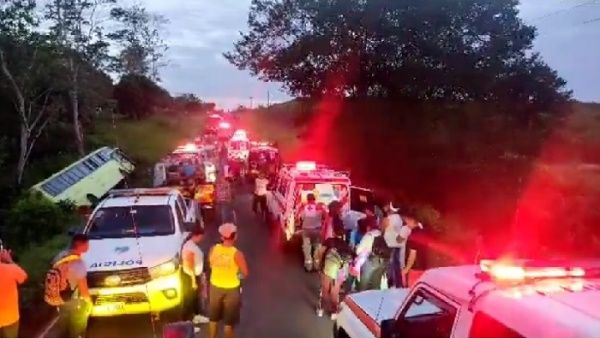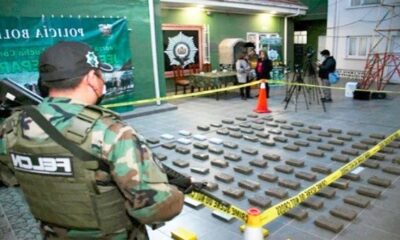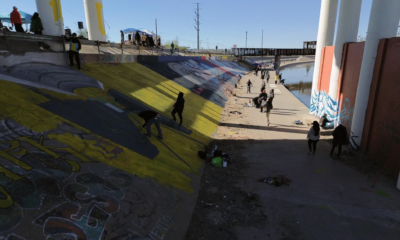Central America
Road accident leaves 20 migrants injured in Costa Rica

July 21 |
The Costa Rican Red Cross reported the day before that about twenty people were injured when a bus with migrants overturned on a route in Costa Rica, near the border with Nicaragua.
The head of the team that attended the emergency, Geiner González, explained that the accident occurred near the small agricultural town of Los Chiles (north) and that the injured were taken to the hospital in the city of San Carlos, about 90 km from the site of the tragedy.
Through a video, the first responder stated: “We have a bus overturned off the road […], one [of the injured] was transferred in critical condition, at the moment ten were transferred in urgent condition and nine in stable condition”.
It was also learned that the accident occurred in the early hours of the morning, shortly before 04H00 (local time, 10H00 GMT) and that “some 60 to 65 migrants” were traveling on the bus. They apparently came from Panama and had the purpose of crossing to Nicaragua to continue to the United States (US).
In search of the so-called “American dream”, the crossing through Central America is the way thousands of people decide to reach it, undertaking a dangerous journey, most of the time illegal.
Last February 16, around 40 people died in Panama when a bus carrying migrants who had crossed the Darien jungle, bordering Colombia, overturned; among them were Venezuelans, Ecuadorians, Haitians and Cubans.
Central America
Nicaragua’s Ortega and Murillo Mourn Pope Francis, Acknowledge ‘Difficult’ Relationship

Nicaraguan President Daniel Ortega and Vice President Rosario Murillo, who also serve as co-leaders of the country, expressed their condolences on Monday following the death of Pope Francis, acknowledging that their relationship with the late pontiff had been “difficult” and “troubled.” Nicaragua officially suspended diplomatic ties with the Vatican during his papacy.
“Our relationship, as Nicaraguans who are believers, devoted and faithful to the doctrine of Christ Jesus, was difficult and troubled—unfortunately shaped by adverse and painful circumstances that were not always understood,” Ortega and Murillo wrote in a message of condolence.
“Despite the complexity and hardships, despite the manipulation we all know occurred, despite everything, we kept our hope alive through Christian faith,” they continued. “We understood the distance, and above all, the complicated and strained communication that prevented better relations. We also recognized the confusion caused by strident voices that disrupted any attempt at genuine interaction.”
Pope Francis had previously compared the Ortega regime to communist dictatorships and even to Hitler, a remark that further strained relations between Managua and the Holy See.
Central America
Cardinal Rodríguez to Attend Funeral of Pope Francis: “He Was Very Dear to Me”

Honduran Cardinal Óscar Andrés Rodríguez announced on Monday that he will attend the funeral services of Pope Francis, who passed away at the age of 88 at his residence in Casa Santa Marta due to a stroke.
“We will be there throughout the novena and then, God willing, at the burial,” Rodríguez said in a phone interview with HRN Radio in Tegucigalpa, apparently calling from Spain.
He added that the last time he saw Pope Francis was in October 2024, during and at the end of that year’s synod, and that they remained in contact through email. “Sometimes, the Pope would even call me,” said Rodríguez, who was born on December 29, 1942, and was made a cardinal by Pope John Paul II on February 21, 2001.
Rodríguez expressed deep sorrow over the passing of Pope Francis, saying: “He was a very dear person to me.”
However, he also shared a message of hope, pointing out that the Holy Father passed away during Easter: “This is a sign. He gave his life completely like the Lord Jesus, and though he died, we believe in faith that he has risen, now with Christ in eternal life.”
Rodríguez, who for ten years coordinated the Vatican’s Council of Cardinals, was one of the eight cardinals selected by Pope Francis to help govern the Catholic Church and reform the Roman Curia.
In January 2023, upon turning 80, Rodríguez stepped down as Archbishop of Tegucigalpa, and Pope Francis appointed Spanish priest José Vicente Nácher Tatay as his successor.
Central America
Senator Van Hollen Meets with Deported MS-13 Member in El Salvador; Trump and Bukele React

U.S. Democratic Senator Chris Van Hollen, representing the state of Maryland, held a meeting in El Salvador with deported MS-13 gang member Kilmar Ábrego García, a member of the criminal group classified by the U.S. government as a terrorist organization.
“Kilmar Ábrego García, miraculously resurrected from the ‘extermination camps’ and ‘torture chambers,’ now sipping margaritas with Senator Van Hollen in the tropical paradise of El Salvador!” wrote President Nayib Bukeleon X (formerly Twitter), sharing photos of Van Hollen, Ábrego García, and a lawyer sitting together at a Salvadoran hotel.
The deported gang member is seen wearing a plaid shirt and a flat-brimmed cap, seated at a table with glasses and coffee cups. The senator also shared images of the meeting on his own social media accounts.
Bukele reaffirmed that Ábrego will remain in El Salvador and will not be returned to the United States.
“Now that his health has been confirmed, he has earned the honor of remaining under the custody of El Salvador,” Bukele added.
Former U.S. President Donald Trump criticized the senator’s meeting with Ábrego on Truth Social, calling Van Hollen “a fool” for advocating for Ábrego’s return to the U.S.
-

 Central America4 days ago
Central America4 days agoUN complaint filed against Costa Rica over detention of migrant children
-

 Central America2 days ago
Central America2 days agoSenator Van Hollen Meets with Deported MS-13 Member in El Salvador; Trump and Bukele React
-

 International4 days ago
International4 days agoACLU seeks emergency court order to stop venezuelan deportations under Wartime Law
-

 Central America23 hours ago
Central America23 hours agoCardinal Rodríguez to Attend Funeral of Pope Francis: “He Was Very Dear to Me”
-

 International3 days ago
International3 days agoThousands rally nationwide against Trump’s threat to U.S. democracy
-

 Central America23 hours ago
Central America23 hours agoNicaragua’s Ortega and Murillo Mourn Pope Francis, Acknowledge ‘Difficult’ Relationship
-

 International2 days ago
International2 days agoPope Francis Appears for Easter Blessing, Calls for Peace and Religious Freedom
-

 International23 hours ago
International23 hours agoDominican Republic Declares Three Days of Mourning for Pope Francis
-

 International23 hours ago
International23 hours agoDHS Secretary Kristi Noem’s Purse Stolen in D.C. Restaurant Heist
-

 International23 hours ago
International23 hours agoPope Francis: The Quiet Architect Behind the U.S.-Cuba Thaw
-

 International1 hour ago
International1 hour agoAmerican universities and colleges sign a letter against Trump’s policy
-

 International2 hours ago
International2 hours agoPope Francis and Trump, a relationship of disagreements marked by migration
-

 International1 hour ago
International1 hour agoA candidate for the Supreme Court denounces an unequal dispute in the judicial election of Mexico
-

 International1 hour ago
International1 hour agoBurma’s military junta extends ceasefire until April 30 due to the earthquake
-

 International1 hour ago
International1 hour agoThe pope last called the Gaza parish on Saturday and asked about the children
-

 International57 mins ago
International57 mins agoTrump’s emissary will visit Russia this week for consultations on the arrangement in Ukraine
-

 International55 mins ago
International55 mins agoWithin Francis’ private wake: respect and prayer for the deceased pope
-

 International1 hour ago
International1 hour agoChurch charges ceased or resigned in the papacy of Francis for cases of pedophilia
-

 International1 hour ago
International1 hour agoCardinal Becciu’s enigma: will he enter the conclave?
-

 International1 hour ago
International1 hour agoRoyal quinoa, the superfood that grows in front of the largest salt flat in the world in Bolivia
-

 International53 mins ago
International53 mins agoThe Government of Colombia presents twelve questions that it will propose in a popular consultation to promote its reforms
-

 International1 hour ago
International1 hour agoInternational leaders begin to confirm their presence at Pope Francis’ funeral





























